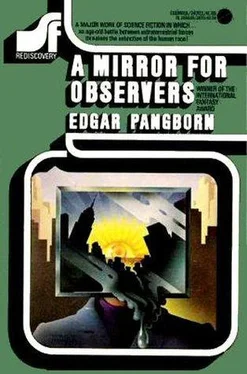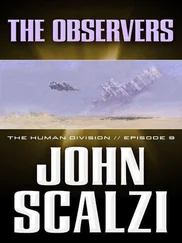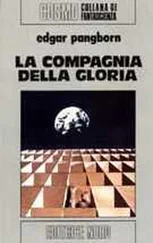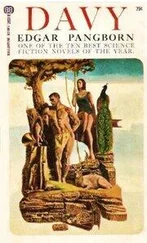I could not assume that what he had told me of the gang war was a lie. I cleared the fence behind him, though not pursuing him now. Seeing his knife in my hand, he swerved into the woods, his one backward look a mad smile. I shall see him again, if I don’t die first of my own hesitating stupidity. His car — Feuermann’s car — was parked behind mine. I slashed its front tires, and drove in my own car back to Latimer.
I parked Andy well beyond No. 21. After killing the motor I could hear something, a distant squealing, more like steam in a kettle than anything else. The dark clutter of houses muffled and shut it away. The moon had risen at last while I was driving back from Byfield, but gave poor help as yet in these blind-faced streets. Lowell Street branched from Calumet two blocks beyond EL CAT SEN; I did not quite know Quire Lane. The houses on Lowell Street were not detached but all one mass, making the narrow street resemble a New York City canyon. When I turned the corner the vicious clamor was no longer far off, but doubled in volume. A breathless running man bumped into me. “Hey, mister, don’t go that way! The gangs—” He caught my arm to steady himself. “Sent for cops, ain’t come, damn it, always the way when you want ’em — thought I’d try ’n’ find the beat cop on Calumet—”
“Anybody hurt?”
“Kids with busted heads — there’ll be worse. Mister, you better—”
“I’m alright. I live down that way.”
“Well, stay inside, I’m telling you. Little bastards chunking rocks off the roofs, right here on Lowell. Hit a little girl — she wasn’t with ’em just running after ’em—”
“Where? Where is she?”
“Huh? Oh, some woman grabbed her, took her into a house—”
“My daughter—”
“My God! Don’t borrow trouble, bud, could be any kid. Anyway, she wasn’t bad hurt, wasn’t even knocked out, see, and this woman—”
“Which house?”
“Other side, second from the next corner.”
I squeezed his arm for thanks and ran.
A stone hit the pavement behind me. Just one (Angelo’s idea?) and the bang of its fall was nearly drowned by the yelling from what must be Quire Lane ahead. My mind declared it could not be Angelo who threw it — not now, not at a single grownup, after the Diggers had already passed by that block. Part of me still insisted on that as I burst into the house.
It was Sharon. They had her on a bed in the front room, two women, one cleaning the gash on her head, the other fluttering. Sharon stopped whimpering when she saw me. I abandoned all Observers’ Rules, kissing and scolding her. “What were you trying to do?” I suppose my irises were gray soup plates, but she wouldn’t have noticed. It was all right, as people say: the bleeding had nearly ceased, and Sharon’s rescuer had the wound properly cleaned. “Sharon, Sharon, what—”
“I wanted to make them stop it. Will you make them stop it?”
“Sure, I’m on my way. It’s all right, Sharon.”
She relaxed partly, and sighed, and wiped her nose with an angrily competent sweep of her whole arm. “Frankly, Ben, you always turn up when I want you, frankly.”
“It’s all right, Sharon. I’ll make ’em stop it.” The women crowded me away then, one of them wanting to know what I meant by letting my little girl run around in the streets. I escaped by saying she wasn’t mine, damn it, I just knew where she lived, and would come back presently and take her home. I ran out in search of a war, and found it.
Quire Lane was a foul alley, a dead end, bordered by two warehouses, ending at the blank rear wall of a third. Later, from the police, I learned what the Mudhawks’ strategy had achieved. The Diggers had stormed up Lowell Street, expecting a prearranged fracas in the relative seclusion of Quire Lane. The idea was simply to see how much mayhem could be dealt and received before the sirens sounded off. Probably the Diggers didn’t exactly understand, when the rocks fell in Lowell Street. They themselves had gone to the trouble of smashing the street lamp at Lowell and Calumet. One boy was killed outright. Police found another afterward, in an areaway, with a broken shoulder. The dead child must have been somewhere in shadow when I was running down that block…. After passing the shower of stones, the Diggers sighted a small detachment of Mudhawks who staged a phony retreat into Quire Lane. Then the main force of Mudhawks closed the trap, swarming out of their hiding places in doorways and up the street, reinforced by the stone throwers from the roofs — by all but one of them, that is. Billy Kell has not been seen since, by myself or by the police, and he was not in the brawl in Quire Lane. Careful of his orange blood?
It seems to be necessary for me to believe that Billy Kell was alone on the roofs after the Diggers had gone by.
The Mudhawks forced the Diggers back to the blind end of the alley, with fists, stones, knives, gleep-guns. By the time I reached that smeared corner of Quire Lane and Lowell, the Diggers understood matters very well and were fighting back with total fury. A certain loathsome moonlight had reached the alley then. I could see plainly. I could not find Angelo.
Some of the boys had flashlights that shot a writhing illumination when they were not being used as clubs. While I was yelling futile things that nobody heard, a Mudhawk — I knew him by his black tam-o’-shanter — dashed by me with a thing that looked like a wooden gun. I glimpsed the elastic bands, the nail in the slot, and tore it out of his hand. He glared foolishly, covered his face with his arm, and ran.
I could not find Angelo.
But now at last there was the thin imperative wrath of a siren, somewhere off on Calumet Street. The boys heard it too, and their stampede began, a stampede of those who could move at all. At least three were lying still at the rear of the alley.
I saw him now. He jumped up from nowhere. He jumped on a box near the clogged mouth of the alley, his shirt ripped away from flailing pipestem arms, blood and dirt all over him, his face beautiful, defiled, insane, and he was screaming: “Get ’em now! Don’t let ’em break away! What are you — chicken? It’s for Bella — “
Few heard him. The sirens were louder and spoke in clearer terms. The boys were all trying to get free of the alley, Diggers and Mudhawks in common panic, blundering into the warehouse walls, into me as I tried to plow my way through to Angelo. Then two patrol cars squealed into place, shutting off retreat, the sirens’ question ending in the affirmative of a growl. Angelo heard that. He leaped off his box before I could catch him — I don’t think he knew me then — and ran unseeingly straight into the grabbing arms of Patrolman Dunn. “One anyway!” said Dunn, and struck him on the ear.
In the next few howling moments they rounded up six or seven besides Angelo. Three of the four policemen were trying for arms or shirt collars instead of using their clubs, but some of it had to be frantic and dirty work. There was an ambulance beyond the patrol cars. I was cursing Dunn root and branch, but I stopped that, and don’t know if he heard it. While he still gripped Angelo’s arm I yelled in his ear: “Dunn! You can’t take him to the station, it’s going to kill his mother if you do.”
“His mo—” It might have been only then that he recognized Angelo. Gore, mud, gravel marks on a mask of anguish — it wasn’t strange.
I pressed my small advantage: “Her heart, man — you can’t. The kid’s only twelve anyhow. He was sucked into it, I happen to know — tell you later. Take him home, Dunn. Don’t book him.”
“Who’re you?”
“I live there. Saw you when we had that burglary.”
Читать дальше












